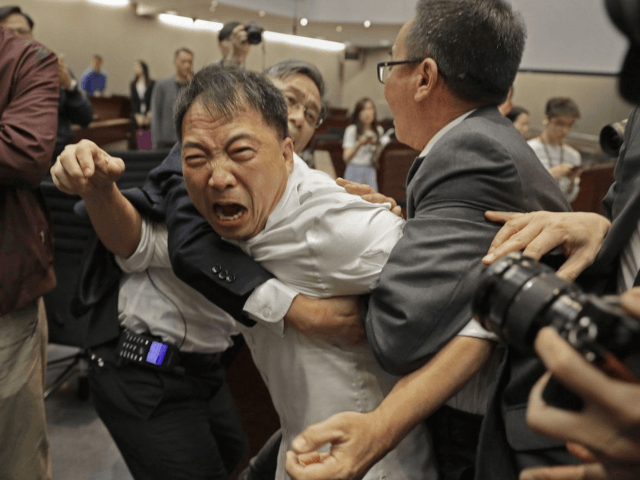The battle in Hong Kong over a bill that would make it easier to extradite people to other countries, notably including China, became quite literal over the weekend as representatives pummeled each other in the legislature, sending one lawmaker to the hospital.
Legislators strove to physically prevent each other from forming committees, yelled through loudspeakers, and forced each other out of the chamber.
The extradition law is enormously controversial because many Hong Kong residents believe it would fatally compromise what remains of the city’s autonomy. Although several other countries would use the new rules to request extradition for wanted offenders, China is the focus of much anxiety because it could pressure Hong Kong judges into complying with its draconian and opaque legal system.
Proponents of the bill seem stunned by the intensity of opposition to the measure, which has become the rallying point for a movement that rivals the huge but ultimately doomed pro-democracy Umbrella Movement of 2014.
Reuters reported on the weekend’s legislative skirmishes, which erupted into numerous physical altercations:
Following the skirmishes on Saturday that saw one lawmaker taken to hospital, pro-democracy lawmakers again tried to hold a committee meeting to discuss the extradition bill. But a scrum ensued as democrats scrambled to block their rivals from holding a meeting of their own.
“Scrap the evil law,” some democrats shouted through loud-hailers as security guards fought to keep the two sides apart.
The pro-Beijing lawmakers left the chamber, saying rational debate was impossible. They returned a little later but were forced to beat a retreat a second time.
The democrats say their rivals breached procedural rules in forming their own committee and in trying to elect their own chairman to usher through the bill. Hong Kong’s Beijing-backed leader, Carrie Lam, has said she wants the bill passed before the summer.
It needs to be voted upon by the full legislature, that is now controlled by pro-Beijing and pro-establishment lawmakers.
The Hong Kong Free Press (HKFP) reported more “drama at the legislature” on Tuesday morning:
Pan-democrats took their seats early to ensure their temporary chairperson James To was in place. When the pro-Beijing camp arrived at 8.30am, their nominated temporary chair lawmaker Abraham Shek was prevented from taking over as democrats and journalists surrounded him. Democrats Claudia Mo appeared to stumble in the ensuing furore.
After the meeting, To told reporters that current circumstances leave no room for political reconciliation between members of the pro-establishment and pro-democracy camp. “We want to have a political meeting and a political reconciliation between parties and the government,” he said. “There’s no hurry at all. We must have political reconciliation. I hope what I’ve said can reach the ears of the Chief Executive, our government officials, and those responsible for the Hong Kong affairs in the Central People’s Government.”
HKFP added that not only are various legislators filing complaints about physical assault, but also making accusations about abusing legislative procedures and falsifying documents.
Writing at Foreign Policy on Monday, research fellow Ben Bland of Australia’s Lowy Institute saw the extradition law as part of China’s final bid to wear down the citizens of Hong Kong until they surrender the last important elements of their autonomy, in keeping with Chinese Communist Party leader Xi Jinping’s bid for total power and inescapable conformity.
Bland warned this strategy could backfire and wreak havoc on Hong Kong because its autonomy has always been a key reason for its easy access to the global economy, and if China pushes too hard for the complete assimilation of Hong Kong, that access could be withdrawn:
The U.S.-China Economic and Security Review Commission, a U.S. congressional body that monitors the national security implications of trade with China, warned that the extradition law would make Hong Kong much less safe for U.S. companies, at a time when Beijing has already shown itself willing to detain foreigners such as the Canadian diplomat Michael Kovrig or the American children of former officials as political hostages.
More importantly, it warned that the change could violate parts of a critical U.S. law. The United States-Hong Kong Policy Act was brought in before the handover to allow the United States to maintain its extensive economic and trade relationships with the former British colony once it returned to Chinese control. The condition was that China adhered to the promises it made to Britain to maintain a “high degree of autonomy” and uphold democratic freedoms.
The act allows the U.S. president to suspend by executive order America’s special treatment of Hong Kong if it is deemed “not sufficiently autonomous.” As the rivalry between the United States and China intensifies, and Beijing’s pressure on Hong Kong increases, the prospects of this provision being deployed will surely grow.
The Chinese Foreign Ministry did nothing to soothe these concerns by insisting Hong Kong affairs are purely an “internal matter” for China to resolve.
As Bland noted, this is not true, since the extradition law could put U.S. and other foreign citizens at risk of being judicially abducted by China when they travel to Hong Kong. The inability of extradition law proponents to imagine a scenario in which Hong Kong could refuse an extradition demand from China is deeply unsettling.
Hong Kong’s Committee to Protect Journalists (CPJ) on Monday asked the government to completely withdraw the extradition bill because it threatens judicial independence and freedom of the press by “introducing the standards of China’s highly politicized judicial system to the territory.”
Concerned journalists noted that China is among the world’s worst jailer of reporters and anticipated a chilling effect on Hong Kong media if China can more easily demand their arrest and extradition.

COMMENTS
Please let us know if you're having issues with commenting.